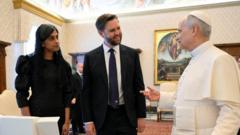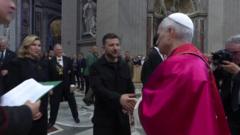The unique intersection of faith and gambling unfolds, showcasing how prediction markets approach the complexities of papal elections.
**Papal Predictions: Betting Markets Set Sights on the Upcoming Conclave**

**Papal Predictions: Betting Markets Set Sights on the Upcoming Conclave**
As online oddsmakers delve into the challenge of predicting the next pope, Cardinal Pietro Parolin leads the betting with other contenders trailing behind.
In a remarkable blend of tradition and modernity, betting on papal elections is experiencing a resurgence as major online prediction markets draw interest in the upcoming conclave set to commence Wednesday. Historically, wagering on the papacy can be traced back to 1503, but for the first time, platforms like Polymarket and Kalshi are focusing on this ancient selection process in a bid to forecast who will succeed Pope Francis.
Currently, Cardinal Pietro Parolin of Italy is significantly favored among bettors, despite a recent round of speculation surrounding his health, which the Vatican has dismissed. Following him in the betting stakes are Cardinal Luis Antonio Tagle from the Philippines and Cardinal Matteo Zuppi of Italy. The prediction markets have enjoyed success in the past, notably predicting President Trump’s election victory, but experts suggest the nuances of the papal conclave present a far more tangled web for gamblers to navigate.
Vatican observers, known as “vaticanisti,” believe that the unpredictable nature of conclave politics complicates forecasts. As Franca Giansoldati, a Vatican specialist, notes, the intricate decision-making process within the conclave, dominated by secrecy and confidentiality, constrains the effectiveness of crowd wisdom in predicting outcomes.
Unlike presidential elections—where bettors can analyze a wealth of public data—conclave participants operate in a starkly different environment. Economist Rajiv Sethi points out that cardinals are unlikely to leak insights that could aid bettors. Additionally, the expected 133 cardinal electors, meeting for the first time, further muddy predictions of the conclave's progress and duration. History has shown that favorites can easily falter: Cardinal Angelo Scola was the predicted choice in 2013, only for Cardinal Jorge Mario Bergoglio to emerge as Pope Francis.
The closed-door nature of the conclave fosters an atmosphere where alliances and decisions shift rapidly and unexpectedly. Stefano Maria Paci, a vaticanista for L’Espresso, emphasizes how critical moments out of the public eye can sway the outcome. As betting on the papal election intensifies—with wagers exceeding $27 million on Kalshi and Polymarket combined—it remains evident that the challenge of forecasting the next pope is steep, but this has not deterred enthusiasm among online bettors, who seem eager to engage with the uncertainties of this historic vote.
Currently, Cardinal Pietro Parolin of Italy is significantly favored among bettors, despite a recent round of speculation surrounding his health, which the Vatican has dismissed. Following him in the betting stakes are Cardinal Luis Antonio Tagle from the Philippines and Cardinal Matteo Zuppi of Italy. The prediction markets have enjoyed success in the past, notably predicting President Trump’s election victory, but experts suggest the nuances of the papal conclave present a far more tangled web for gamblers to navigate.
Vatican observers, known as “vaticanisti,” believe that the unpredictable nature of conclave politics complicates forecasts. As Franca Giansoldati, a Vatican specialist, notes, the intricate decision-making process within the conclave, dominated by secrecy and confidentiality, constrains the effectiveness of crowd wisdom in predicting outcomes.
Unlike presidential elections—where bettors can analyze a wealth of public data—conclave participants operate in a starkly different environment. Economist Rajiv Sethi points out that cardinals are unlikely to leak insights that could aid bettors. Additionally, the expected 133 cardinal electors, meeting for the first time, further muddy predictions of the conclave's progress and duration. History has shown that favorites can easily falter: Cardinal Angelo Scola was the predicted choice in 2013, only for Cardinal Jorge Mario Bergoglio to emerge as Pope Francis.
The closed-door nature of the conclave fosters an atmosphere where alliances and decisions shift rapidly and unexpectedly. Stefano Maria Paci, a vaticanista for L’Espresso, emphasizes how critical moments out of the public eye can sway the outcome. As betting on the papal election intensifies—with wagers exceeding $27 million on Kalshi and Polymarket combined—it remains evident that the challenge of forecasting the next pope is steep, but this has not deterred enthusiasm among online bettors, who seem eager to engage with the uncertainties of this historic vote.




















